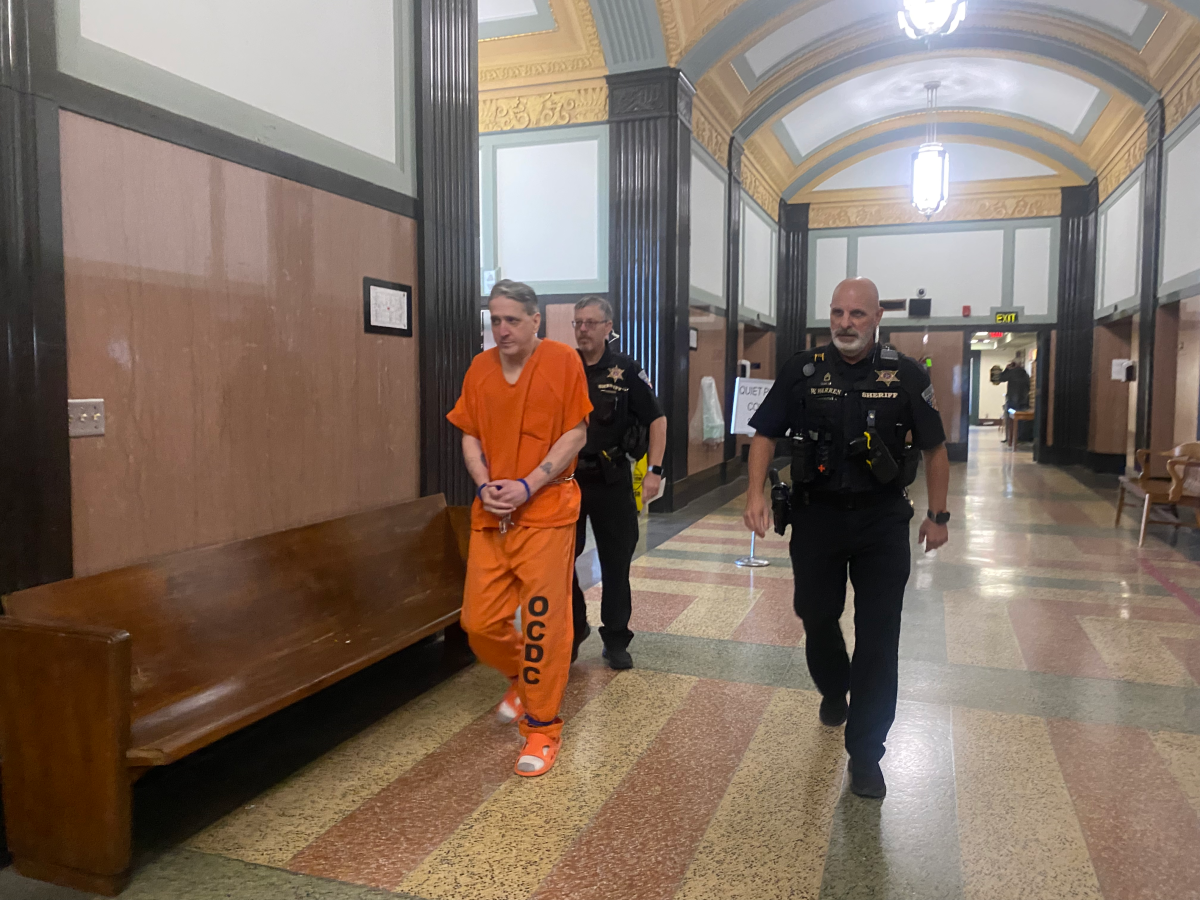Copyright The Intercept

From her perch on the witness stand, 81-year-old Fern Smith cast a flinty stare at the defense attorney standing before her. Once a veteran prosecutor at the Oklahoma County District Attorney’s Office, she wore a black chiffon scarf, gold earrings, and an obstinate air, her gray hair pulled back in a tight bun. She did not look at Richard Glossip, sitting across the Oklahoma City courtroom alongside his lawyers. Smith had last seen him more than two decades earlier, not long after convincing a jury to sentence him to die. “You’re here under a subpoena, correct?” defense attorney Corbin Brewster began. It was October 30, 2025. Smith was the last witness at an evidentiary hearing that started at 10 a.m. The U.S. Supreme Court had overturned Glossip’s conviction eight months earlier, only for Oklahoma’s attorney general to announce he would retry Glossip for murder. But two criminal court judges had since recused themselves from the case, both on the grounds that, as former Oklahoma County prosecutors, they might appear too close to the office that sent Glossip to death row. Now Glossip’s attorneys were seeking the recusal of a third judge, Susan Stallings for the same reason — and in particular, due to her links to Smith, the original prosecutor in the case. Stallings had already conceded that she worked under Smith in the early 1990s and credited her as a formative influence. She’d also reluctantly volunteered that she traveled with Smith on a group trip to Spain in 1997 — the same year Glossip was charged with a murder he swore he did not commit. But Stallings insisted that this was the extent of her relationship with Smith. And she maintained that she did not need to step down from the case. Glossip’s lawyers were unconvinced. Although Stallings said she hadn’t spoken to her old mentor in decades, the two had seen each other as recently as April 2025, at a court hearing to investigate alleged misconduct in the case of a different man Smith sent to death row, 46-year-old Tremane Wood. Testifying at that hearing, Smith denied she’d done anything wrong — and Stallings, the presiding judge, found her testimony persuasive, ruling against Wood and setting him up for execution. He is scheduled to die on November 13. To Glossip’s attorneys, the Wood hearing was a cautionary tale. To probe whether Stallings had disclosed the full details of her relationship with Smith, they sent Smith a subpoena in advance of Glossip’s October hearing that included a request for emails, text messages, and any other documented communications between the two women since Stallings was elected to the bench in 2018. “Did you bring any documents with you?” Brewster asked. No, Smith replied. “I don’t have any of the documents that you requested.” In fact, she didn’t bother to look. “I don’t have to,” she told Brewster matter-of-factly. “I know I didn’t have any.” Smith’s casual disregard of the subpoena was startling. But then, it had already been a strange, tense day in court. Stallings was both the subject of the recusal hearing and the presiding judge, which made for an uneasy — sometimes bizarre — dynamic. Although the hearing primarily concerned her own judicial obligations, the discussion repeatedly returned to the question of Smith’s ethical lapses. It was Smith, after all, who “originated the State’s theory, decided to pursue the death penalty, oversaw key early investigative decisions, and controlled the flow of evidence to the defense” in Glossip’s case, defense lawyers wrote in their recusal motion. The result was a prosecution that had been flimsy and corrupted from the start. Glossip was twice convicted and sentenced to death for the murder of his boss, motel owner Barry Van Treese, who was brutally murdered at the Best Budget Inn on the outskirts of Oklahoma City in January 1997. A 19-year-old handyman named Justin Sneed admitted to fatally beating Van Treese with a baseball bat but insisted that Glossip bullied him into doing it. His account became the basis for the state’s case against Glossip – and for a plea deal that allowed Sneed to avoid the death penalty. At Glossip’s 1998 trial, Smith told jurors that he’d taken advantage of the younger, more vulnerable Sneed, offering him money to kill their boss so that Glossip could take over the motel. “Glossip encouraged, aided and abetted and sent Mr. Sneed off to do his dirty work,” she said. But this story began falling apart not long after Glossip arrived on death row. A video of Sneed’s police interrogation cast serious doubt on the state’s version of events, revealing coercive questioning by Oklahoma City detectives who pressured Sneed into implicating Glossip. At the recusal hearing, one of Glossip’s previous appellate attorneys recalled the significance of the discovery, which debunked Smith’s claim at trial that Sneed’s account “has remained consistent from day one.” In reality, the lawyer testified, “the tape revealed this to be false.” The defense’s failure to present the tape to the jury would lead an Oklahoma court to overturn Glossip’s first conviction based on ineffective assistance of counsel. Although a second jury convicted him and sent him to die in 2004, doubts over Glossip’s guilt continued to grow. Some of the most explosive revelations pointing to his innocence came in after Glossip’s near-execution in 2015, among them, evidence that Sneed had tried to recant his testimony and that Oklahoma County prosecutors ordered the destruction of key evidence in Glossip’s case between the first and second trial. Glossip’s attorneys were certain that the order to destroy evidence came directly from Smith. (Smith did not respond to emails from The Intercept.) Throughout the hearing, both Stallings and lawyers for the state questioned why the defense kept invoking Smith’s alleged misconduct rather than focusing on her own capacity to be impartial. But the issues were inextricable. Prosecutorial misconduct had indelibly shaped Glossip’s case — it was the reason the high court finally threw out Glossip’s conviction — and the details of Smith’s alleged misconduct would be used by Glossip’s defense to challenge the evidence against him. “You will be the gatekeeper for this,” Glossip’s longtime attorney, Don Knight, told Stallings in his opening statement. Brewster was prepared to ask Smith about her alleged misconduct. But first, he needed to address the trip to Spain. Smith had been asked to provide records of any travel she’d done with Stallings. Did she take any photos during their vacation? “I didn’t take photographs then, I don’t take photographs now,” Smith replied. Brewster pressed on. “Other than that trip to Spain, what other trips have you been on with her?” Suddenly, Smith was a lot more forthcoming. “We went to Las Vegas,” she said. That was in October 1996, which she only remembered because her husband was diagnosed with a brain tumor and died that same year, she explained. The trip included Stallings and “several other ladies from the DA’s office.” “OK,” Brewster said. “Other than the Vegas trip and the trip to Spain with Judge Stallings,” were there any more trips? “I believe there was one more trip to England. And I believe we went to London and Paris,” Smith said. That was a larger group of people, she went on, including several members of her own family: her mother and sister, along with Smith’s late husband and mother-in-law. Stallings was there too, Smith said. But “it was a group trip and I didn’t see her very much.” Among the spectators in the gallery, all eyes turned to Stallings. The judge had apparently been caught in a lie of omission. Stallings only disclosed one vacation with Smith to Glossip’s attorneys. Now there were three. As Brewster would later tell the judge, “any person might reasonably question whether you can be impartial going forward in this case given the evolving disclosures about trips with Fern Smith.” Deputy Attorney General Jimmy Harmon would try to soften the impact of the revelations. “It sounds like that was kind of a common theme during that era of the DA’s office, that a group of co-workers may have traveled together,” he told Smith on cross-examination. “Did that mean you were best friends with that person?” No, Smith replied. “Were you ever close personal friends with Susan Stallings?” “No,” Smith said. “I considered her a friend but not a close personal friend.” Smith went on, stammering a bit. “I mean, I don’t know, but I consider her like I would any other person that I worked with in the DA’s office, as a friend.” This included Harmon. “I consider you a friend,” she told him. She scanned the room and spotted a different veteran prosecutor she recognized, who had nothing to do with the case, but was watching from the jury box. “I hope I’m his friend. I hope he’s my friend,” Smith said. The prosecutor smiled, stood up, and interjected without hesitation. “I’ll stipulate that we are, Your Honor.” In his opening statement that morning, Knight, Glossip’s longtime attorney, made clear that the hearing was about much more than Stallings or Smith — or even Glossip himself. The case was the product of an entrenched prosecutorial culture that had never been reckoned with in Oklahoma City. “It’s not a great culture,” Knight said bluntly. “Honestly, Your Honor, it’s got a bad reputation around the country. There’s a lot of death sentences here, a lot of death sentences that were overturned here.” What they were asking for, Knight said, was a judge not steeped in this culture. The prosecutor who pledged his friendship with Smith in open court only underscored the problem. Although Glossip’s legal team included some of the most seasoned defense attorneys in the country — including legendary capital defense attorney Judy Clarke — they were outsiders in Oklahoma City. “You guys are all friends,” Knight told Stallings. The state, meanwhile, sought to cast Glossip’s attorneys as “judge shopping” while trampling over judicial rules and norms. Harmon objected at every turn, including to the delivery of an opening statement, during which Stallings and Knight had engaged in a back-and-forth. “It is unlike any opening statement I have ever seen,” he complained. Much of the day was spent on Glossip’s first witness, Georgetown University law professor Abbe Smith, who explained that the question of recusal was based on the appearance of bias, rather than bias itself — and opined that, based on the evidence, Stallings should disqualify herself from Glossip’s case. In an aggressive cross-examination, Harmon led Professor Smith on a performative parsing of Oklahoma’s Code of Judicial Conduct to determine where, exactly, it said that a judge in Stallings’s position was required to disqualify herself from a trial. At times, Harmon’s questions served as an awkward reminder that his boss, Attorney General Gentner Drummond, spent years lambasting Glossip’s conviction and death sentence — joining Glossip’s attorneys in asking the U.S. Supreme Court to rule in his favor — before reversing himself to retry him for murder. Noting that former U.S. Solicitor General Paul Clement argued on behalf of the Oklahoma Attorney General’s Office at the high court — and that Clement once clerked for Justice Antonin Scalia — Harmon demanded to know whether Glossip’s lawyers had requested that Scalia recuse himself from the case. “Your honor, I’m not sure that Justice Scalia was alive at the time,” Clarke interjected. “Good point,” Harmon said. Throughout the hearing, Glossip sat in the courtroom in an orange jumpsuit, a blue shawl laying awkwardly over his chest to keep him warm. He’d lost weight since his last court appearance, and he had dark circles under his eyes. Over the last decades, he had survived nine execution dates and seen more than 100 of his neighbors put to death. He was 35 years old when he’d arrived on death row. Now he was 62. Although he was no longer living under a death sentence, Glossip’s daily life was in many ways worse than before. The Oklahoma County jail, where he’d been transferred to await trial, was a site of endless chaos: loud, filthy, and often deadly. His health had deteriorated, and he was struggling to get medical attention for his symptoms. And while his weekly contact visits with his wife had sustained him over his last few years on death row, Glossip could not see her in person at the jail. Still, compared to his old neighbors, Glossip was lucky. While he watched his powerhouse legal team fight for an unbiased judge to preside over his third trial, Tremane Wood was back at the state penitentiary in McAlester staring down an execution date. His case, too, was a product of the culture Knight described, along with a disastrous legal defense by a court-appointed attorney who later admitted he had failed his client while struggling with addiction. Convicted under Oklahoma’s felony murder statute in 2004, Wood was sentenced to die despite his brother’s insistence that he, not Wood, was responsible for fatally stabbing the victim in the case. An in-depth HuffPost investigation of Wood’s case recounted how the brothers were tried back to back, with the state offering shifting theories of the crime. At Wood’s trial, then-Assistant District Attorney Fern Smith pushed back on the claim. “Isn’t it true that you are only testifying here to save your brother’s life?” she asked Wood’s brother, Jake. But when it came time for Jake’s trial, Smith and her co-counsel flipped the script, arguing that he indeed had stabbed the victim. His admission of guilt had come straight “from the defendant’s mouth,” Smith said. Concerns over the prosecution’s conduct were enough to prompt the notoriously conservative Oklahoma Court of Criminal Appeals to grant an evidentiary hearing, which took place in April 2025. Although it did nothing in the short term to stop Wood’s execution, it did produce evidence that would prove to be decisive for Glossip at his hearing six months later. Glossip’s attorneys cited Wood’s hearing in their argument for recusal. At the hearing, they called Wood’s attorney, Assistant Federal Public Defender Amanda Bass Castro Alves, who described the proceeding in her client’s case. “I would characterize Ms. Smith’s demeanor as hostile,” she testified. Stallings, on the other hand, had described it as “resolute” and credible upon ruling against Wood. It was getting late in the day when Brewster finally broached the question of Smith’s alleged misconduct; it did not go smoothly. Presented with her own handwritten notes from a hearing in 2001, Smith said they did not refresh her memory about being the lead prosecutor at the time. Brewster asked if she was suggesting it might be possible that another prosecutor was in charge then. “Anything is possible,” Smith said. “Do you understand that while you were lead attorney there were several items of material evidence from the crime scene of this homicide in your possession in the DA’s office that were ordered to be destroyed?” Brewster asked, interrupted by another objection. Brewster eventually grew exasperated. “We’re at a point, Judge, where the last, probably, 10 questions I’ve asked, you’ve sustained objections to,” he told Stallings. “I wouldn’t have to object if he would ask relevant questions,” Harmon shot back. Brewster said he was trying to lay a foundation for his argument. “Whoever is presiding over this case is going to be either granting or denying relief on these issues,” he said. Stallings interrupted. “This is not an evidentiary hearing as to how the court is going to rule in the future,” she said. “And I promise you I am scratching the surface of this issue,” Brewster replied. “If I was going to get into the misconduct of Fern Smith, we’d need another day.” Stallings remained unmoved. “That’s not why we’re here today,” she said. Brewster returned to something Smith said at the start of her testimony. Despite denying any correspondence with Stallings, Smith did recall receiving one email from the judge. “She sent me a copy of the findings of fact and conclusions of law in the Tremane Wood case,” Smith said. She could not pull up the email, Smith said, since it was on her computer at work. And she demurred when asked if the email included any kind of greeting. “I might have said thank you,” she said. Now Brewster had one last question — not for Smith but for Stallings. “Judge, at this time I’d ask the court to produce the email and Ms. Smith’s response to the email that was referenced in her testimony,” he said. “I can check,” Stallings said, and called for a recess. Stallings returned carrying copies of the email, which had included the ruling in Wood’s case as an attachment. Brewster read the response from Smith to Stallings out loud. “Thank you so much!! Amazing!! I don’t know when I’ve seen a more thorough analysis and well reasoned opinion,” it said. Brewster began to read Stallings’s response but was interrupted. “I think the exhibit speaks for itself,” Smith said. “It probably does, Brewster replied. “But if you’ll indulge me.” He read the reply. “Which I can’t take credit for,” Stallings had written. “It’s the proposed findings from the AG’s Office. They did do an outstanding job.” The words seemed to hang in the air. Wood’s execution was fast approaching. And it had just been revealed that the judge in his case had emailed a witness — the original prosecutor and her own mentor — lavishing praise on the lawyers who were seeking to kill him. It would not take long for Stallings to announce her decision from the bench. She did not bother to hide her indignation. “It’s obvious from today’s long hearing that the defense wishes to make the court a distraction in this case to get what they want,” she said. “In order to move this case along, in order to stop this dog and pony show so that they can continue on their journey to get the judge they want, the court is going to recuse.” A few days after the hearing, Wood’s lawyers sought a stay of execution based on the revelations in court. “The new evidence reveals that Judge Stallings concealed the full extent of her relationship with Fern Smith from Mr. Wood’s counsel,” they wrote. Stallings had emailed Smith “to celebrate absolving Ms. Smith” of the misconduct allegations. On November 6, the Oklahoma Pardon and Parole Board voted 3–2 to recommend clemency for Wood. Wood’s life now lies in the hands of the governor. If he does not intervene, Wood will soon die by lethal injection. In the meantime, a new judge has been assigned to Glossip’s case. She, too, is a former Oklahoma County prosecutor.



